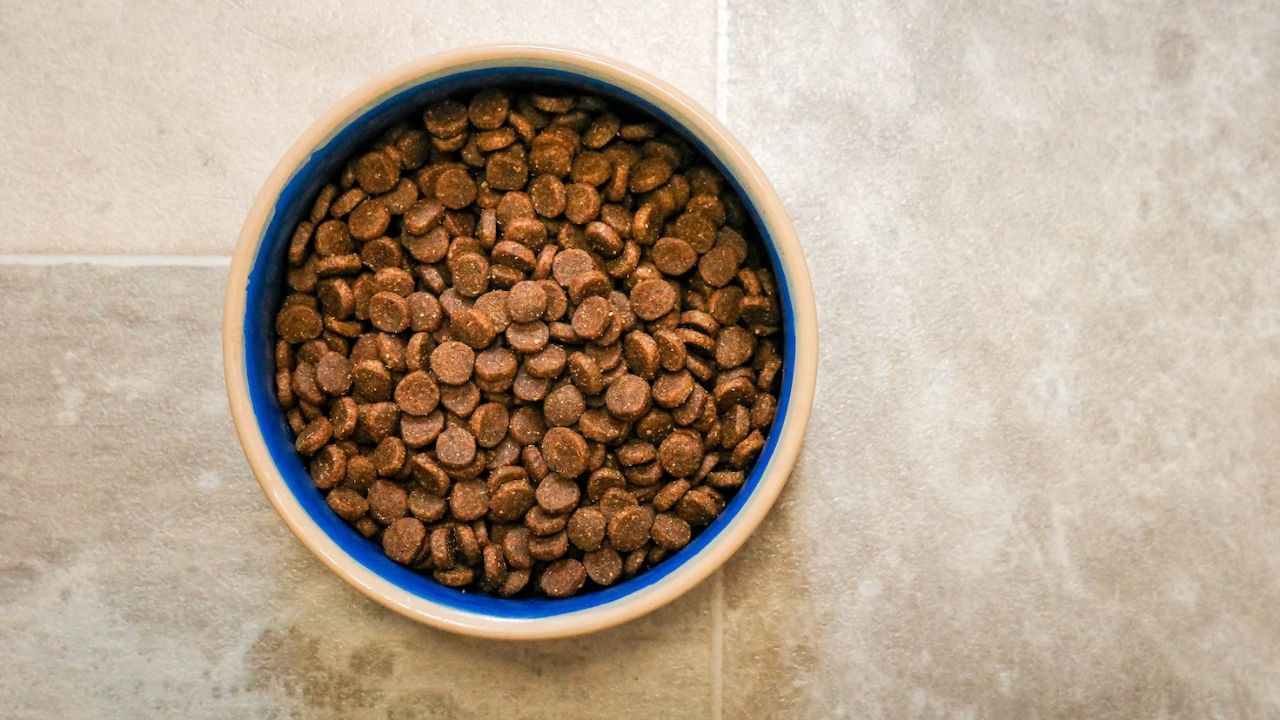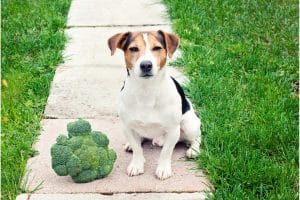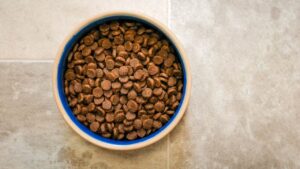Are you a dog owner who wants to positively impact the environment without affecting your doggy’s well-being? If so, you’re in the right place.
In my last article, we discussed what it means to be an eco-friendly dog owner in the UK and how to become one. So this one is an extension of that article because some of you asked me to share my top picks for eco-friendly food.
Choosing eco-friendly dog food goes beyond simply providing nutrition to your pet. It’s about making conscious choices prioritising sustainability, and minimising the carbon pawprint associated with conventional pet food.
With an increasing demand for environmentally responsible alternatives, the UK has witnessed the rise of reputable brands that specialise in eco-friendly dog food. These brands not only focus on the health and well-being of your dog but also prioritise sustainable ingredient sourcing, packaging, and manufacturing practices.
And if you do not trust any of them, I’ll help you make DIY pet food at home that’s totally waste-free and eco-friendly at home.
Recommended Eco-Friendly Dog Food in the UK
To be clear, my recommendations are intentionally fewer than most articles on the Internet. Other companies like Primal and Sunday’s produce dog food that’s greener than most, but I’m only considering products with immaculate eco-friendly practices. You know, so you get the best you want.
1. Lily’s Kitchen
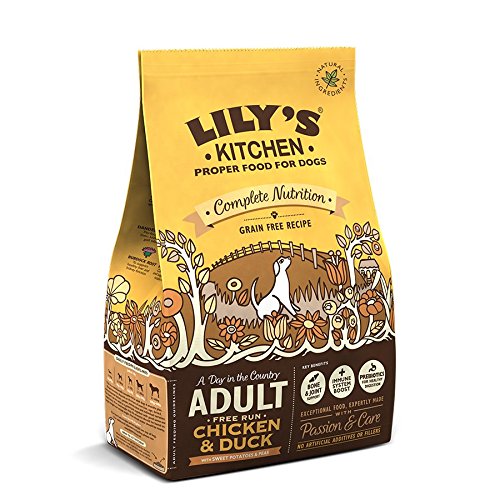
I know. I was shocked too. A brand as recognisable and OG as Lily’s Kitchen isn’t often associated with modern practices. But Lily’s Kitchen has been producing organic and eco-friendly products for a while now.
Lily’s Kitchen Adult Organic are the best eco-friendly and sustainable dog food products in the UK in 2023 in terms of taste, nutrition and pricing (£8.43 / kg). They offer vegan dog food options, use organic ingredients, and prioritise low-waste recyclable packaging.
Unlike products with cheap fillers, their recipes feature wholesome, nutritious, and natural ingredients such as real meat and vegetables. They partner with Terracycle to ensure that even the difficult-to-recycle items find an eco-friendly end.
This commitment to ethical practices is evident in their achievements, such as consistently scoring 100/100 in the Ethical Company Index Score and being the first and only pet food company certified as a B Corp in the UK.
Buy Lily’s Kitchen Organic Dog Food on Amazon
2. The Honest Kitchen
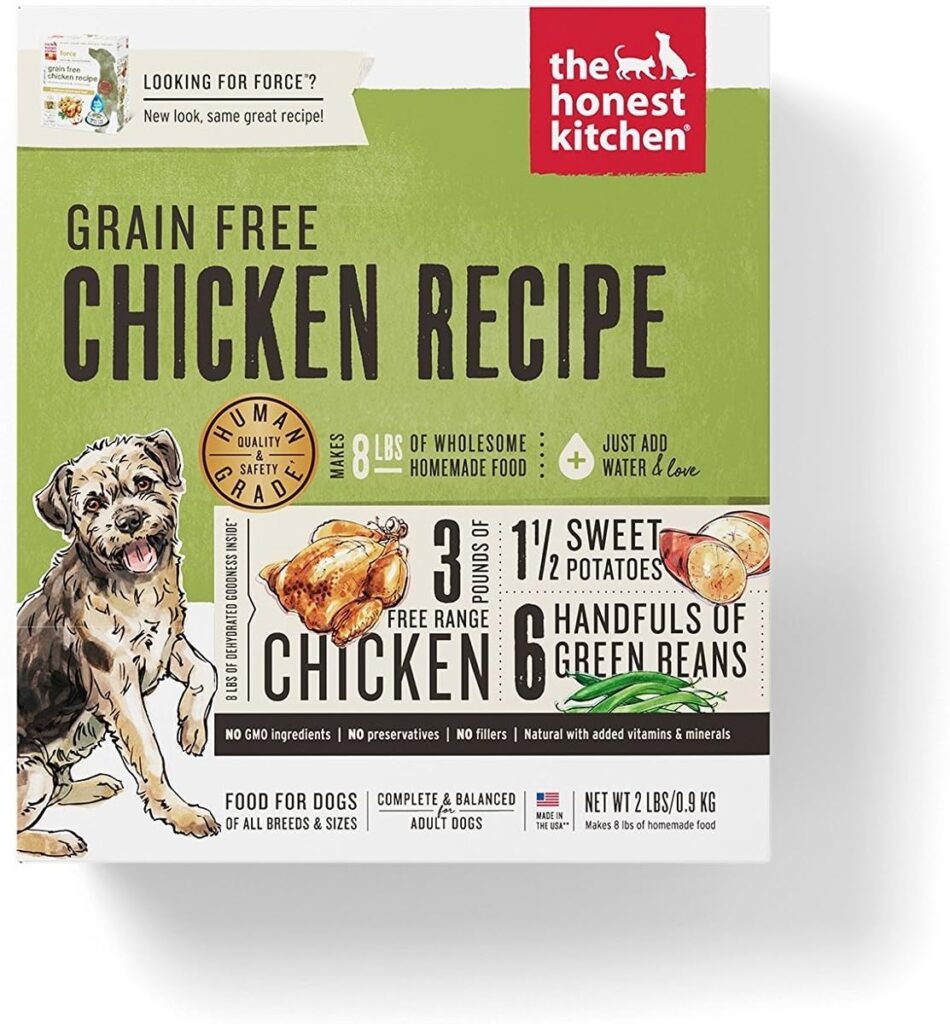
The Honest Kitchen is the trailblazer in creating 100% human-grade pet food.
While most pet food is deemed “feed grade,” The Honest Kitchen sets a higher standard. They make eco-friendly dog food matching your pooch’s needs, including grain-free and whole-grain options.
What sets them apart is the commitment to using only the highest quality ingredients and safer standards in human-grade food. They offer a diverse range of options for your dog’s discerning palate, including whole food clusters, dehydrated food, one-pot stews, toppers, and even butcher block pâté—yes, pâté for dogs!
With a strong focus on ingredient sourcing and transparency, The Honest Kitchen ensures that 84% of its ingredients come from North America, some being organic or MSC certified.
They maintain a Food Source Map that lists the origins of their ingredients and collaborate only with suppliers who provide proof of food origins, screening, handling, cleaning, and adherence to Good Manufacturing Practices (GMPs). Furthermore, they prioritise fair trade channels and do not source ingredients from China.
The mainstay of The Honest Kitchen is its dehydrated, high-quality food mixes, which offer complete nutrition or serve as base mixes that require added protein to meet AAFCO standards.
One standout option from The Honest Kitchen is their Kindly Grain-Free Veggie, Nut & Seed Base Mix (View Price on Amazon).
This entirely plant-based mix reduces environmental impact compared to meat and dairy products and lowers shipping costs and greenhouse gas emissions due to its dehydrated form. Add warm water and a protein source, wait three minutes, and serve.
Buy Honest Kitchen Dehydrated Grain-Free Chicken Dog Food on Amazon
Buy Honest Kitchen Dehydrated Grain-Free Beef Dog Food on Amazon
3. Jiminy’s
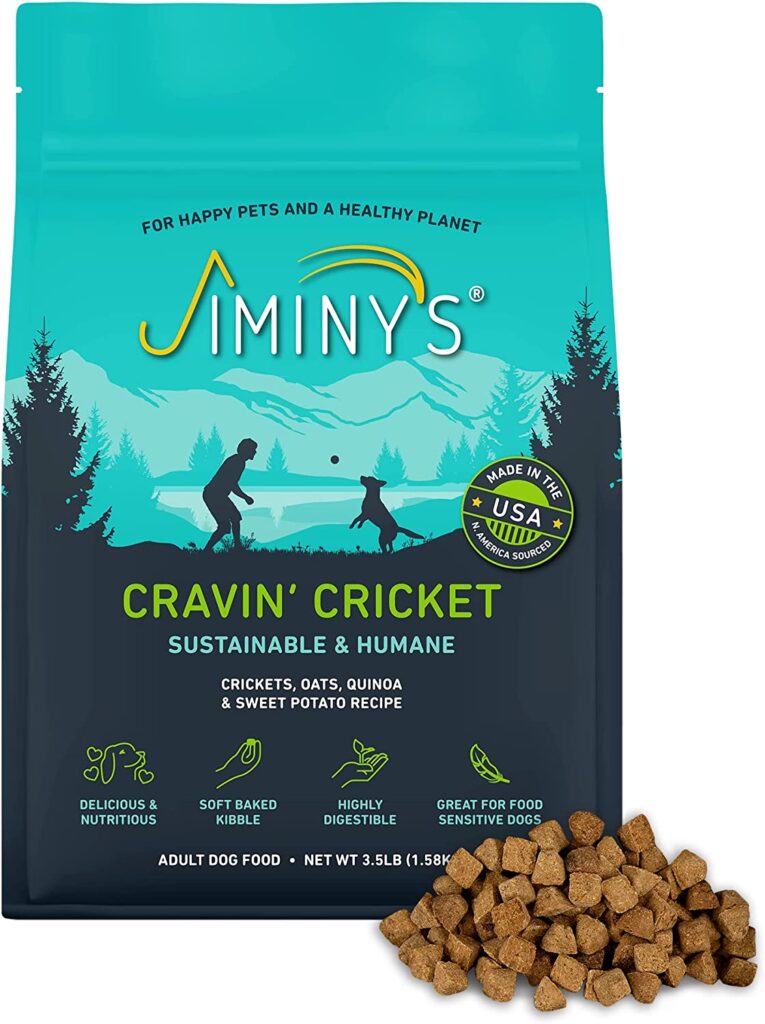
Introducing Jiminy’s, the brand that will make your dog jump for joy, just like Pinocchio’s nose when he tells the truth.
Their kibble is free from common allergens such as corn, wheat, soy, and animal meat. Instead, they utilise all-natural, minimally-processed ingredients like oats, quinoa, and sweet potato. By avoiding grains, their food suits dogs with specific dietary needs.
What sets Jiminy’s apart is its innovative use of alternative protein sources. Their Cravin’ Cricket and Good Grub eco-friendly dry dog foods incorporate crickets and dried black soldier fly larvae, respectively.
These protein sources are complete and provide numerous benefits, particularly for dogs with skin conditions requiring an anti-inflammatory diet.
Insect protein offers unique advantages, including being hypoallergenic, safe for sensitive stomachs, and rich in prebiotics. Additionally, it is less susceptible to common meat pathogens, providing a safe and nutritious option for your furry friend.
If you have any concerns or questions about the ingredients, don’t worry. All their products are veterinarian formulated to meet AAFCO standards for adult dogs.
By switching your dog to Jiminy’s, you can save an incredible 500,000 gallons of water per year compared to traditional dog food, making it one of the most sustainable options.
Furthermore, their kibble is oven-baked in small batches in the USA, preserving more nutrients than extruded cooking methods involving high heat and pressure.
Buy Jiminy’s Hypoallergic Organic Dog Food on Amazon
Read More: How to be an eco-friendly dog owner in the UK?
4. Open Farm
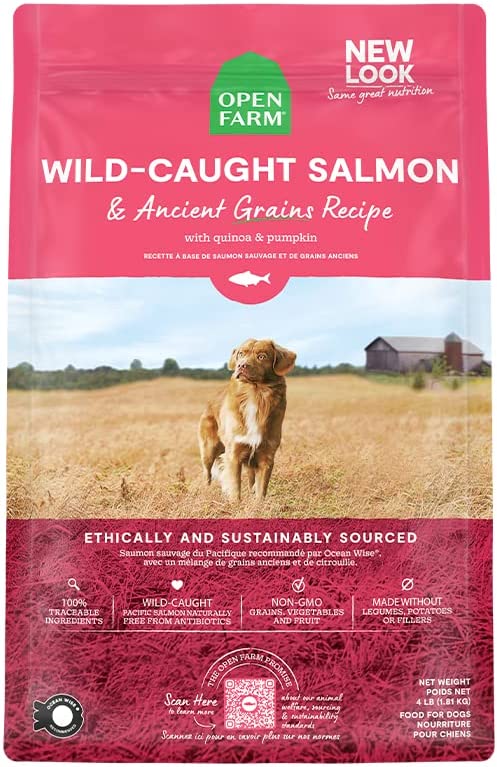
While their non-GMO dog food is manufactured in Minnesota, Open Farm takes pride in sourcing locally from audited and certified partner farms, supporting local communities and reducing their carbon footprint.
Granted, Open Farm is not certified organic, but they prioritise the Certified Humane program for their meat ingredients. This program is similar to USDA Organic and ensures that animals are raised without antibiotics or artificial growth hormones.
The animals are fed a vegetarian diet, and farmers must meet specific animal care and welfare standards. This commitment to ethical practices sets Open Farm apart from conventional systems and demonstrates its dedication to providing high-quality, sustainable dog food.
Buy Open Farm Wild-Caught Salmon & Ancient Grains Dry Dog Food on Amazon
5. Steve’s Real Food
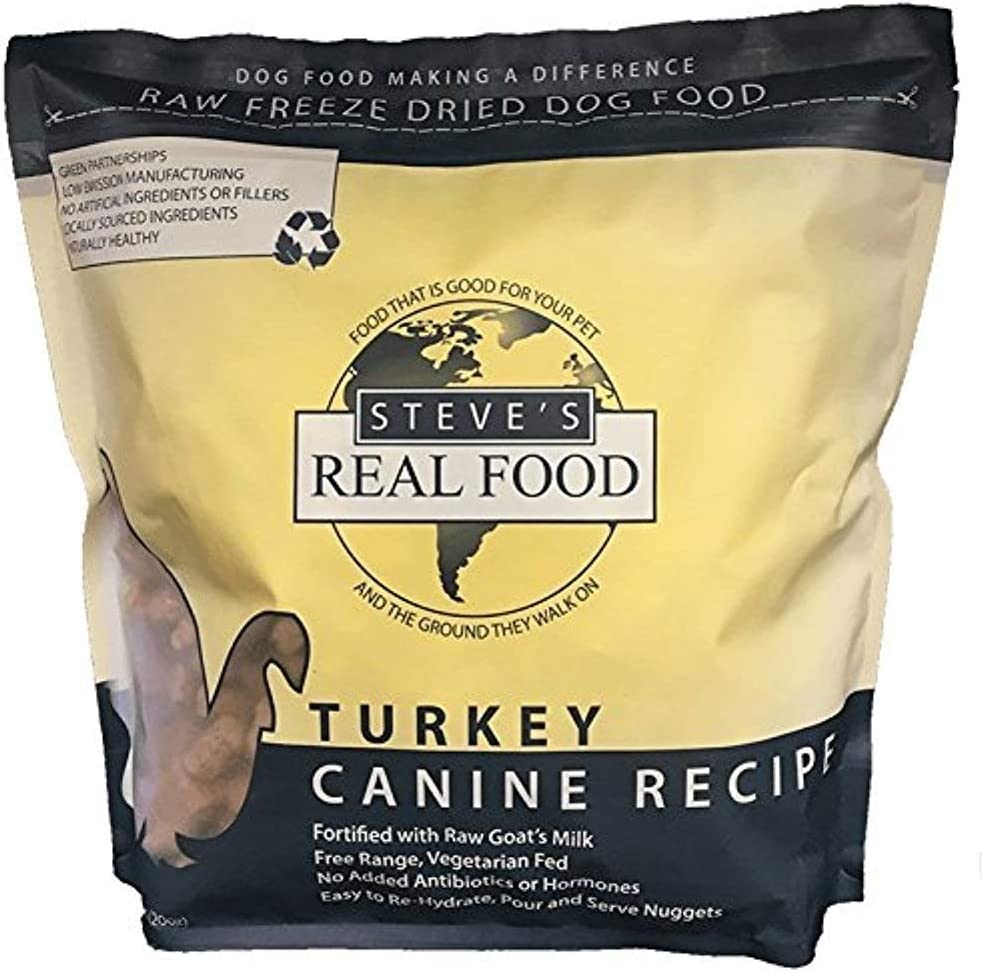
They use only human-grade, USDA-inspected meat from free-range animals alongside whole foods to create tater-tot-sized nuggets that are nutritionally complete and balanced.
Plus, they’ve been in business since 1998 as one of the first commercial raw pet food brands. They’re also more affordable than most heavily hyped raw brands, as they pride themselves on keeping things simple with low overheads and no fancy marketing.
The fresh, pesticide-free produce comes from Norpac, a farmer-owned cooperative including more than 200 farmers in Oregon. Formulas also feature salmon, coconut, flaxseed, raw goat’s milk, kelp, and sea salts to add healthy fats, probiotics, enzymes, and trace minerals.
Steve’s Real Food offer frozen and freeze-dried dog food formulas, including their Frozen Turkey formula, which provides 142 calories per 100 g, comprises 80% meat and bone, and 20% produce. By weight, the BARF formula is 14.6% protein, 8.9% fat, 0.7% fibre, and 74% moisture.
Buy Steve’s Real Food Freeze-Dried Raw Nuggets on Amazon
Buyer’s Guide: Choosing the Best Eco-Friendly Dog Food
When choosing the ideal dog food, several important factors must be considered.
1. Ingredient Sourcing
Look for brands that prioritise locally sourced and sustainable ingredients. Supporting local farmers and suppliers reduces the carbon footprint associated with long-distance transportation and promotes a more resilient local economy.
Organic ingredients are another important consideration. Organic farming practices eliminate the use of synthetic pesticides and fertilisers. As an added bonus, you protect your dog from potential exposure to these harmful chemicals.
Additionally, look for free-range or pasture-raised animal proteins. Animals raised in a free-range or pasture-raised environment can access open spaces and exhibit their natural behaviours.
2. Packaging and Waste Reduction
Packaging plays a significant role in the eco-friendliness of any product. Look for brands that prioritise minimal packaging and use recyclable or compostable materials.
Consider purchasing dog food in bulk or larger sizes to reduce the amount of packaging waste generated. This approach minimises waste and is more cost-effective in the long run.
3. Manufacturing Practices
Look for companies that prioritise energy-efficient production processes and eco-conscious manufacturing facilities. Some brands use renewable energy sources, such as solar or wind power, to reduce their carbon footprint.
Others may invest in initiatives that support environmental conservation or promote sustainable practices throughout their supply chains.
Research the brands’ commitments to sustainability and ethical practices. Look for certifications or partnerships with organisations that advocate for animal welfare, sustainable agriculture, and responsible sourcing.
Brands that are transparent about their manufacturing processes and ingredients are often more trustworthy and align with your eco-conscious values.
By considering these factors when choosing eco-friendly dog food, you can positively impact the environment while providing your dog with nutritious and scrumptious meals.
Read More: Beginner’s Guide to High-Fibre Dog Food in the UK 2023
How to make your own eco-friendly dog food at home?
If you want complete control over your dog’s diet and minimise packaging waste, homemade and DIY eco-friendly dog food is an excellent option.
1. Homemade Meals for Dogs
Preparing homemade meals gives you full control over the ingredients in your dog’s food. You can choose organic, locally sourced ingredients that align with your eco-conscious values.
Here are some tips you can follow:
- Consult with a Veterinarian: They can provide guidance on appropriate portion sizes, nutritional requirements, and any specific dietary needs your dog may have.
- Include a Variety of Ingredients: Aim for a balanced mix of protein, healthy fats, carbohydrates, and vegetables. Protein sources include lean meats like chicken, turkey, or fish, while carbohydrates can come from whole grains like brown rice or quinoa. Vegetables like sweet potatoes, carrots, and green beans provide essential vitamins and fibre.
- Avoid Harmful Foods: Some human foods can be toxic to dogs, so it’s crucial to research and avoid ingredients like onions, garlic, grapes, chocolate, and artificial sweeteners.
- Proper Food Handling and Storage: Cook meat thoroughly to avoid bacterial contamination, and refrigerate or freeze leftovers in appropriate containers.
2. DIY Dog Treats and Snacks
In addition to homemade meals, you can also make your own dog treats and snacks. Not only does this give you control over the ingredients, but it also allows you to avoid excessive packaging waste and artificial additives.
Here are some simple and healthy recipes for homemade dog treats:
Peanut Butter Banana Bites:
- Mash a ripe banana and mix it with natural, unsalted peanut butter.
- Drop spoonfuls onto a baking sheet lined with parchment paper.
- Freeze until firm, then transfer to an airtight container and keep them in the freezer.
Sweet Potato Chews:
- Preheat the oven to 250°F (120°C).
- Slice sweet potatoes into thin strips or rounds.
- Place them on a baking sheet lined with parchment paper.
- Bake for about 2-3 hours until they’re dry and chewy.
Carrot and Apple Crunchies:
- Grate carrots and apples, and mix them together in a bowl.
- Scoop small portions onto a baking sheet lined with parchment paper.
- Bake at 350°F (175°C) for about 20-25 minutes until they’re crispy.
These DIY dog treats are simple to make and can be stored in airtight containers for several weeks. Just ensure you use organic and natural ingredients to ensure the treats are healthy and free from harmful additives.
How to transition your dog to eco-friendly dog food?
Transitioning your dog to a new diet requires careful consideration and a gradual approach. This will ensure a smooth adjustment and maintain your furry friend’s health and well-being.
Abrupt changes in diet can cause digestive upset and discomfort for your dog. By gradually transitioning, you give your dog’s digestive system time to adapt and minimise the likelihood of any adverse reactions.
Mix a small amount of the new eco-friendly dog food with your dog’s current food. Begin with a ratio of about 25% new food to 75% old food and gradually increase the proportion of the new food over several days or weeks. Monitor your dog’s response and adjust the transition speed accordingly.
Frequently Asked Questions (FAQs)
1. Why should I choose eco-friendly dog food?
Eco-friendly dog food options prioritise sustainability and minimise the environmental impact associated with conventional pet food production. By choosing eco-friendly options, you support your dog’s health and well-being and contribute to a greener future.
2. Are eco-friendly dog foods nutritionally balanced for my dog?
Generally, reputable eco-friendly dog food brands ensure their products are nutritionally balanced and meet the necessary dietary requirements for dogs. Choosing brands that have undergone rigorous testing and meet recognised nutritional standards is important.
2. Are eco-friendly dog food options more expensive than conventional ones?
Generally, eco-friendly dog food options may be slightly more expensive due to high-quality ingredients and sustainable practices. However, the long-term benefits to your dog’s health and the environment outweigh the cost difference.
3. Can I immediately switch my dog’s food to an eco-friendly option?
Transitioning your dog’s food gradually is recommended to avoid digestive issues. Start by mixing small amounts of the new food with the old food and gradually increase the proportion of the new food over time.
4. How can I properly dispose of dog waste in an eco-friendly manner?
Dispose of dog waste in designated dog waste bins specifically designed for proper waste management. Alternatively, consider composting dog waste in specialised compost systems designed for pet waste.
5. Can I still buy commercial dog food and be eco-friendly?
Some commercial dog food brands prioritise eco-friendly practices. Look for brands that use sustainable sourcing, recyclable packaging and support environmental initiatives. Read labels and do your research to make an informed choice.
